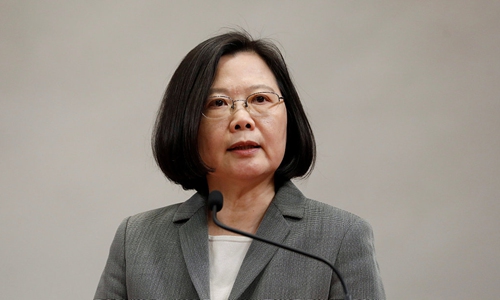HOME >> OPINION
Tsai and DPP must curb radical tendency
Source:Global Times Published: 2020/1/11 21:36:31

Tsai Ing-wen Photo:VCG
Taiwan's regional leadership and legislative elections were held on Saturday. Situation showed the current leader Tsai Ing-wen realized the reelection after winning more than half of the votes. The Democratic Progressive Party (DPP) is also set to win more than half of the legislative seats. Kuomintang chairman Wu Den-yih has announced his resignation.
The DPP had suffered a major setback in Taiwan's nine-in-one local elections in November 2018 following which Tsai was fiercely attacked by members of DPP. At one point, it seemed like she was almost abandoned by DPP. But Tsai not only stabilized her position in the party but also realized reelection by rebounding in less than one and a half years. Obviously, this is not something common to Western-style elections and struggles among parties.
Over the past months, Tsai and DPP exploited administrative resources and crushed their opponents through approaches devoid of a bottom line. The most typical example was the passing of the anti-infiltration law at the end of 2019, through which they wantonly hyped up the so-called threat from the Chinese mainland while slandering Han Kuo-yu's mainland connections.
Every time Taiwan goes to polls, the most convenient tactic of the DPP is orchestrating tensions across the straits and mongering fear among the Taiwan people toward the mainland. The cross-Straits ties have to a large extent been poisoned by troubles stirred up by the DPP for winning the elections. This time, the election took place against the backdrop of the US adjusting its China policy and defining China as the "strategic competitor." This has made it easier for Tsai to play her tricks.
After the outbreak of radical protests in Hong Kong, which was triggered by an extradition amendment bill, the DPP authorities also linked Hong Kong's affairs with Taiwan, further inciting various misreading of the mainland. The level of pro-secession camp's demonization of the mainland has reached a peak in recent years. Their description of the Chinese mainland and its Taiwan policy cannot be more absurd.
Unfortunately, new political infightings have taken place within the KMT too and the support for Han was further disrupted.
Han lost the election, but the forces supporting him is on a rise. The Taiwan public's demand for economic development, improvements in people's living standards, and opposition against fierce confrontation across the straits are real. The Chinese mainland's increasing influence cannot be overlooked.
Tsai's authorities are able to maintain their rule by playing tricks to woo voters, but they are unable to tie the Taiwan society to the chariot of Taiwan secession. In fact, the Taiwan society has formed a collective consciousness to oppose Taiwan secession among Taiwan people. Even the US has refrained from publicly promoting Taiwan secession, which will lead to a showdown with Chinese mainland. China has enough international support to safeguard its one-China principle.
The reelection of Tsai will increase the uncertainty across the Taiwan Straits. It may encourage Tsai and the DPP to take the extreme path.
Yet no matter how much uncertainty there is across the straits, the fact that the Chinese mainland is getting increasingly stronger and the Taiwan island is getting weaker is an inevitable reality. In the long run, the role the US can play across the straits will be gradually weakened. Recognizing and complying with the reality is the only feasible option for Taiwan's peaceful development. If Tsai and the DPP authorities are to lead the island toward the opposite direction, history will label them as a sinner of all Chinese people.
Posted in: EDITORIAL